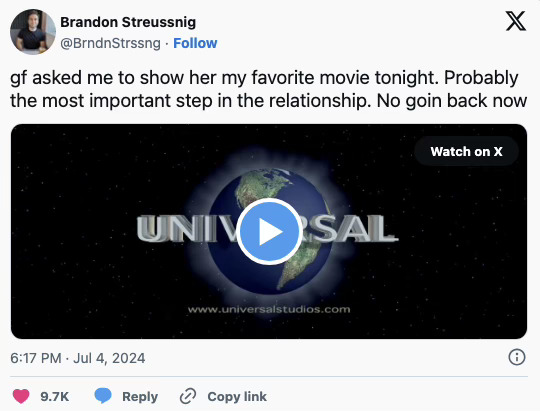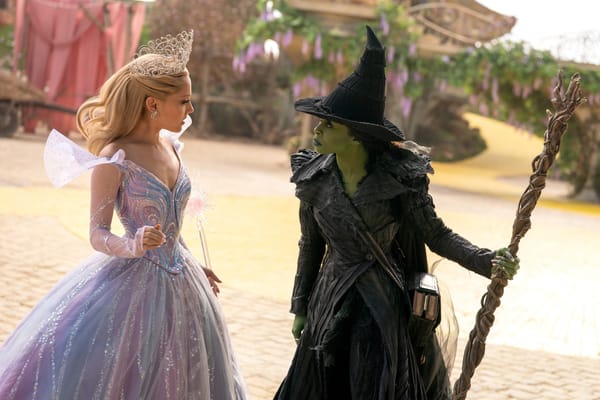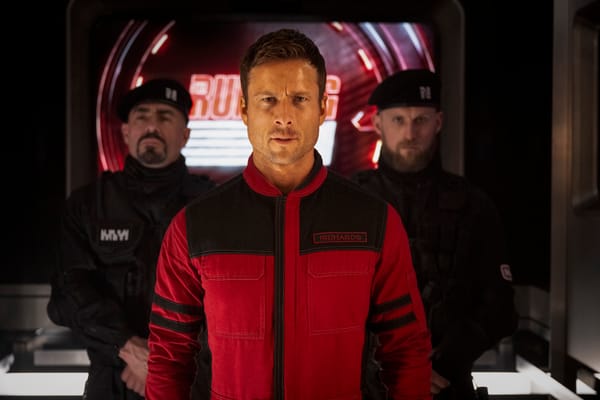It's Exhausting When Every Day Is Historic
A few reactions to this weekend's events, plus some thoughts on 'Longlegs.'

Hey readers: It’s been a bit quiet at the Decoding Everything newsletter for a bit and that’s largely because of a couple things. First, it’s House of the Dragon season and A Cast of Kings podcast is back! I’m really enjoy doing the podcast with Kim Renfro and Jessie Earl this year but doing four weekly podcasts (The Filmcast, Decoding TV, A Cast of Kings, and my Patreon podcast, plus bonus episodes) really takes a lot out of me creatively, and it has meant I’m writing on here less than I’d like to. Additionally, I’ve been spending a lot of time focused on both improving my poker game, plus pursuing some other external professional opportunities that have recently landed in my inbox.
That said, there’s obviously been a lot going on recently and I’m eager to talk about it. Up ahead in this edition:
- Thoughts on this weekend’s major news
- Why Film Twitter melted down over Michael Mann’s Miami Vice
- Some thoughts on Longlegs, which is out in theaters now
When Major News Breaks
On Saturday, a 20-year-old man named Thomas Matthew Crooks opened fire on Trump during a rally in Butler, Pennsylvania. Trump’s ear was hit and at least one man was killed.
This was obviously a major topic of discussion online and I wanted to share how I personally approach an event of this magnitude:
1) Remember On The Media’s Breaking News Consumer’s handbook - In 2013, the news program On The Media released a handbook for things to keep in mind any time a major news event happens (typically, a shooting). The summary bullets are presented below but I’d recommend you read the entire thing here.
In the immediate aftermath, news outlets will get it wrong.
Don’t trust anonymous sources.
Don’t trust stories that cite another news outlet as the source of the information.
There’s almost never a second shooter.
Pay attention to the language the media uses.
“We are getting reports”…could mean anything.
“We are seeking confirmation”… means they don’t have it.
“[News outlet” has learned”…means it has a scoop or is going out on a limb.
Look for news outlets close to the incident.
Compare multiple sources.
Big news brings out the fakers. And photoshoppers.
Beware reflexive retweeting. Some of this is on you.
I’ve referred back to this handbook frequently and very often I find at least one of its points is vindicated each time a major event is covered.
2) Resist the Urge To Post - Re-emphasizing the last point above: I’ve seen a lot of posts over the course of the past day and very few of them have been useful, edifying or helpful. On the right, there has been a significant intensifying of the political rhetoric. On the left, there’s been way more conspiracy theorizing than I would’ve thought, with tons of people speculating that this was some kind of staged or false flag attack (for more analysis of the latter, see ’s post on the subject). I’ve also seen countless jokes and memes about the assassination attempt, at least some of which is probably ill-advised given how things might play out in the days to come.
A few commentators have posted useful information and/or other sentiments that have helped to contextualize these events in our current political climate and in American history. But my personal philosophy is that in the immediate aftermath of something like this, unless you’re a journalist or someone who has actual, useful information to share, you’re probably just adding to the noise and stressing yourself out in the process.
3) Don’t Panic (Yet) - The attempted assassination of a former President is a shocking act that likely foreshadows further instability and potential violence in the months leading up to the election this fall. That said, I’ve seen a lot of doomsaying, with people making statements like “This is the moment Trump won the election!” and so forth. There’s nothing wrong with being upset by watching an event unfold like this, but I’ve found the confident prognostication from the left to be a bit premature and, again, not particularly useful.
Jay Kuo, who writes the excellent newsletter , weighed in on the history of assassination attempts and their political implications:
Another popular hot take is that the election will now swing irrevocably to Trump as a martyr and survivor of an assassination attempt. Historically speaking, however, the aftermath of unsuccessful assassination attempts is a mixed bag for candidates.
Ronald Reagan saw an initial surge of support when he was shot. His approval ratings rose some 8 points as the nation rallied to his side. But it was not an election year, and his numbers fell back down sharply in just a few months due to economic issues. It was far enough away from the presidential campaign in 1984 that its impact couldn’t really be measured.
Gerald Ford saw two unsuccessful attempts on his life in 1975. But he went on to lose the election in 1976 to Jimmy Carter […]
I suspect that Trump’s base will rally strongly to him, just as we have seen Biden’s base do when he came under attack from the media and the pundits over his debate performance. The GOP at its upcoming convention will seek to portray Trump as hero and a fighter, and now they believe they have a strong narrative and imagery to bolster that effort. We should expect to see Trump’s numbers rise from this, but how much and for how long remains unclear.
It’s entirely possible we will look back on this as the turning point after which everything changed for this fall’s election. But unless or until that becomes clear, it doesn’t change the stakes, the things that people are fighting for, or the work that needs to be done between now and then.
Am I The Asshole: Miami Vice Edition
This is a weird one: On July 4, writer Brandon Streussnig tweeted a meme about showing his girlfriend the 2006 Michael Mann film Miami Vice:

Here’s how I’d summarize the events that followed:
- A Twitter user derogatorily responded to this by quote tweeting it and saying, “Straight men live on a completely different planet than the rest of us, WHOT is this”.
- Hundreds of users dogpiled her for both questioning the brilliance of Miami Vice and for invoking gender essentialism in her quote tweet.
- She doubles down, going on a multi-day Twitter binge in which she directly rebuffed her attackers, then claiming that she was using the critical responses to her for anthropological research purposes (For context, she’s tweeted 163.6K times since creating her account — an average of around 37 tweets per day, every day, for the past 12 years).
- Users discovered that that she was one of the main characters in this Atlantic article about the Guggenheim, fueling another round of posts about the situation.
- The IFC Center in New York celebrated Miami Vice by holding a special screening of it this past weekend.
There’s a popular subreddit called “Am I The Asshole” where people post situations and ask whether or not they were in the wrong. One common abbreviated response: ESH, or “Everyone Sucks Here.”
ESH would be my personal assessment of this situation (no shade at Streussnig though, who was just sharing his love for a movie with his gf). I’m reminded of film critic A.O. Scott’s exit interview, in which he spoke about the tendency of Twitter users to mob people who don’t share their opinions about something:
[T]he behavior of these social media hordes represents an anti-democratic, anti-intellectual mind-set that is harmful to the cause of art and antithetical to the spirit of movies. Fan culture is rooted in conformity, obedience, group identity and mob behavior, and its rise mirrors and models the spread of intolerant, authoritarian, aggressive tendencies in our politics and our communal life.
In other words: People should just let people have bad opinions about movies! I don’t know why Twitter felt the need to light this person up and the dogpiling felt pretty excessive and fraught, given the mildness of the sentiment from the original post. (Side note: I’d maybe understand reacting this way for a movie of Mann’s like Heat or Collateral — maybe even The Insider. But Miami Vice? Really?)
That said, on the other side, if your reaction to people’s criticism is to double down on your self-righteousness and to say, “I AM the storm,” people will probably have a pretty strong backlash to that. At the end of the day, this incident demonstrates that one way of making sure something blows up far beyond the level it needs to is to tweet through it.
Longlegs Delivers on the Atmosphere (And Not Much Else)

Longlegs is about to give Neon its best opening weekend in history, bringing in $22.6MM and (along with A Quiet Place: Day One) helping to end this year’s horror slump at the box office. Undoubtedly, they pulled off a marketing coup for this $10MM-budgeted film. But is the movie any good?
Longlegs tells the story of Lee Harker (Maika Monroe), an FBI agent who tries to catch a suspected serial killer named Longlegs (Nicolas Cage), ostensibly responsible for multiple family murders. Writer/director Osgood Perkins does a fantastic job creating an unsettling atmosphere throughout. Pretty much the entire film is created using mid- to wide-angle shots, putting the viewer in the uncomfortable position of seeing way more of the frame than they are use to — the eye basically begs for a close-up, and by denying us, Perkins ramps up the tension subconsciously. Monroe puts in a gripping, understated performance as Harker, who we learn early on might be haunted by possibly psychic abilities.
That said, the movie falls apart a bit in its final act. After reading a bunch of explainers about the movie’s ending (like this one), I’ve come to the conclusion that the movie just isn’t particularly clear — not just in how it explains its central mystery, but also just in how it shows literally what events actually took place. (As an example, I read this Vulture piece that describes a different set of facts about how the plot unfolded than what a colleague and I thought happened.) It’s hard to agree on what the movie’s takeaway should be when it’s difficult to even agree on what the plot is.
That’s not necessarily deathly for a film’s prospects — I’m okay turning out for something that’s mostly vibes! Sadly, a considerably bigger hurdle was that Nicolas Cage’s performance just did not work for me and felt like it was coming out of a completely different, much more campy film. I’ve always been a fan of Cage and have admired his late stage work in smaller films like Pig and The Unbearable Weight of Massive Talent. Here, his version of Longlegs comes off to me like a collection of attention-grabbing tics rather than a believable, haunting character.
I’m thrilled that Longlegs is doing well at the box office and that audiences are willing to pay for movies that are bold and different. Unfortunately, while I loved the atmosphere of the film, I didn’t find much else to connect to.



